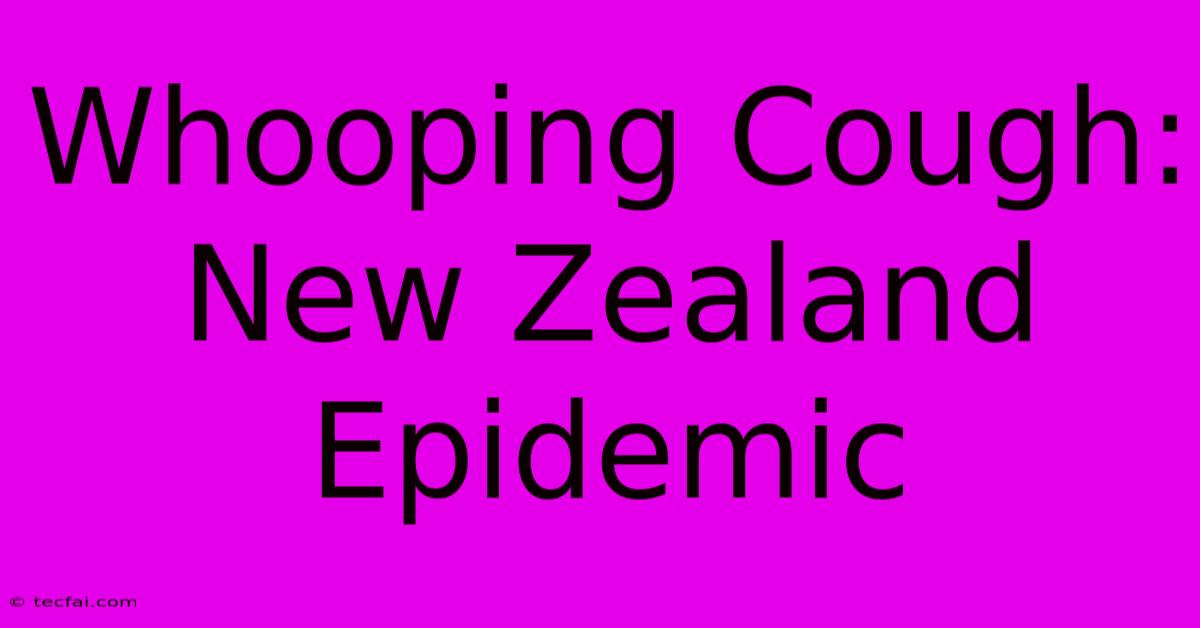Whooping Cough: New Zealand Epidemic

Discover more detailed and exciting information on our website. Click the link below to start your adventure: Visit Best Website tecfai.com. Don't miss out!
Table of Contents
Whooping Cough: New Zealand Epidemic – Understanding the Current Situation
New Zealand, a nation renowned for its stunning landscapes and high quality of life, is currently grappling with a concerning rise in whooping cough cases. This highly contagious respiratory illness, also known as pertussis, poses a significant threat, particularly to infants and young children. Understanding the current epidemic, its causes, and preventative measures is crucial for protecting the community's health.
Understanding Whooping Cough
Whooping cough is caused by the bacterium Bordetella pertussis. It's characterized by severe coughing fits followed by a "whooping" sound during inhalation – hence the name. While adults might experience milder symptoms, infants and young children are most vulnerable to severe complications, including pneumonia, seizures, brain damage, and even death. The highly contagious nature of the disease makes it easily spread through airborne droplets produced during coughing or sneezing.
Symptoms of Whooping Cough
Recognizing the symptoms is crucial for early diagnosis and treatment. While the characteristic "whooping" cough isn't always present, particularly in younger children, other common signs include:
- Persistent cough: This is often the first and most prominent symptom.
- Runny nose: Usually precedes the coughing fits.
- Low-grade fever: May be present, but not always.
- Vomiting: Can occur during coughing fits.
- Fatigue: Extreme tiredness is common.
If you suspect whooping cough, seek medical attention immediately. Early diagnosis and treatment with antibiotics can significantly reduce the severity of the illness and prevent its spread.
The Current Epidemic in New Zealand
New Zealand has experienced fluctuating rates of whooping cough over the years. However, recent reports indicate a noticeable surge in cases, classifying it as an ongoing epidemic. Several factors contribute to this:
Declining Vaccination Rates
One significant factor is the fluctuating vaccination rates across different age groups. While vaccination remains the most effective preventative measure, a decrease in uptake can lead to increased susceptibility within the population, allowing the disease to spread more easily.
Waning Immunity
Even with vaccination, immunity can wane over time, necessitating booster shots. This is especially true for older children and adults. The effectiveness of the vaccine also varies; it's not 100% effective, meaning some vaccinated individuals can still contract the illness, albeit often in a milder form.
Increased Community Transmission
The highly contagious nature of whooping cough means that even small increases in cases can rapidly lead to widespread transmission within communities, particularly in settings such as schools and childcare centers. This rapid spread is further fueled by the often-subtle early symptoms, which may not immediately trigger medical intervention.
Protecting Yourself and Your Family
The good news is that there are effective ways to protect yourself and your family from whooping cough:
Vaccination
Vaccination is the cornerstone of whooping cough prevention. New Zealand's immunization schedule includes the pertussis vaccine as part of the childhood immunization program. Ensuring your children receive all recommended doses is vital. Adults should also consider discussing booster shots with their healthcare provider, particularly those in contact with infants.
Good Hygiene Practices
Practicing good hygiene significantly reduces the transmission of whooping cough and other respiratory illnesses. This includes:
- Frequent handwashing: Wash your hands thoroughly and often, especially after coughing or sneezing.
- Covering coughs and sneezes: Use a tissue or your elbow to cover your mouth and nose when coughing or sneezing.
- Avoiding close contact: Limit close contact with individuals who are sick.
Staying Informed
Staying informed about the current situation and public health advisories is crucial. Monitor official government health websites and follow recommendations from health officials.
Conclusion
The whooping cough epidemic in New Zealand highlights the importance of continued vigilance and preventative measures. Vaccination, coupled with good hygiene practices, remains the most effective strategy in controlling the spread of this dangerous illness. By taking proactive steps, we can protect our communities and safeguard the health of our most vulnerable populations. Regular communication with healthcare providers and staying updated on public health advisories are crucial steps in managing and mitigating the impact of this ongoing epidemic.

Thank you for visiting our website wich cover about Whooping Cough: New Zealand Epidemic. We hope the information provided has been useful to you. Feel free to contact us if you have any questions or need further assistance. See you next time and dont miss to bookmark.
Featured Posts
-
Dubai Jail Case Uks Support For Briton
Nov 22, 2024
-
Aaron Judge 2024 Al Mvp
Nov 22, 2024
-
Bondi Proponent Of Trumps 2020 Claims
Nov 22, 2024
-
Sydney Derby Preview One Return One Question Mark
Nov 22, 2024
-
Ipl Pant And Lyons Mic Exchange
Nov 22, 2024
